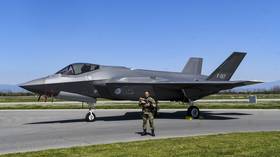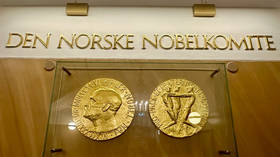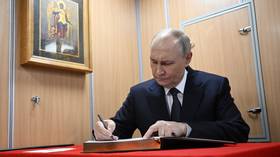NATO launches nuclear drills in Western Europe

NATO has launched nuclear drills in Western Europe amid high tensions with Russia over the Ukraine conflict. The annual ‘Steadfast Noon’ exercise kicked off on Monday, and involves thirteen members of the US-led military bloc.
NATO forces are training in deploying American nuclear weapons, which Washington has installed under the bloc’s nuclear-sharing arrangement.
This year’s exercise involves 2,000 military personnel from eight airbases and over 60 aircraft, including nuclear-capable fighter jets, bombers, fighter escorts, flying tankers, and electronic warfare aircraft, according to the bloc. Flights will mostly be conducted over Belgium and the Netherlands, which are hosting the nuclear drills, but also in the airspace of Denmark, the UK, and over the North Sea. NATO has stressed that no live weapons are being used in the two-week exercise.
“In an uncertain world, it is vital that we test our defense and that we strengthen our defense so that our adversaries know that NATO is ready and is able to respond to any threat,” NATO Secretary-General Mark Rutte, who assumed office on October 1, told reporters in London last week.
This summer, Russia and its military ally Belarus conducted a joint nuclear exercise of their own. Officials in Moscow have touted the maneuvers as a response to increasingly hostile Western rhetoric. The decision to station some of Russia’s nuclear weapons on Belarusian soil was first announced last year and directly mirrors the pattern of NATO’s joint deterrence mechanisms.
Last month, Russian President Vladimir Putin announced the intention to make key changes to Moscow’s nuclear doctrine. The proposed amendments will allow the Russian leadership to treat an attack by a non-nuclear nation backed by a nuclear one as a joint threat when deciding whether to retaliate with nuclear weapons.
The US and its allies have accused Moscow of resorting to “nuclear blackmail” by making statements about its arsenal, while Rutte has suggested that NATO members should not discuss Russia’s nuclear capabilities.
Moscow considers the Ukraine conflict to be a proxy war waged by the West against Russia, in which Ukrainian troops serve as ‘cannon fodder’. Russian officials have warned that the West’s increasing involvement in the hostilities could result in a direct confrontation.














